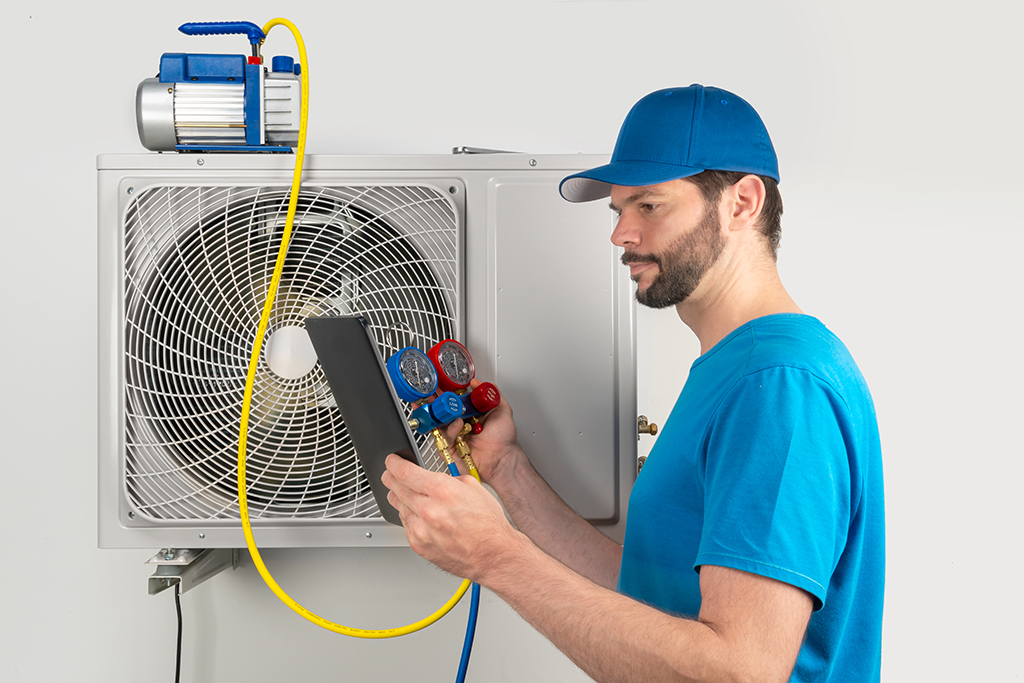Air Conditioning Repair Euless TX Understanding how air conditioning affects IAQ is crucial for ensuring healthy and comfortable indoor environments.

Here’s an in-depth exploration of the relationship between air conditioning and indoor air quality:
1. Filtration and Particle Removal:
- Air conditioning systems typically include air filters designed to capture airborne particles such as dust, pollen, pet dander, and mold spores. High-efficiency particulate air (HEPA) filters can effectively remove small particles, improving IAQ by reducing allergens and pollutants.
- Regular maintenance of air filters is essential to ensure optimal filtration efficiency. Dirty or clogged filters can restrict airflow and reduce the system’s ability to remove particles from the air, potentially leading to decreased IAQ.
2. Humidity Control:
- Air conditioning systems help regulate indoor humidity levels by removing excess moisture from the air. Controlling humidity is crucial for preventing mold and mildew growth, which can adversely affect IAQ and contribute to respiratory problems.
- However, excessively dry indoor air can also pose challenges, such as dry skin, irritated respiratory passages, and increased susceptibility to respiratory infections. Maintaining relative humidity levels between 30% and 50% is generally recommended for optimal comfort and IAQ.
3. Ventilation and Fresh Air Intake:
- Central air conditioning systems often recirculate indoor air without introducing fresh outdoor air, which can lead to indoor air stagnation and the buildup of pollutants.
- Incorporating ventilation strategies such as mechanical ventilation systems, air exchangers, or opening windows can help dilute indoor pollutants and improve IAQ by bringing in fresh outdoor air.
- Proper ventilation is especially important in tightly sealed buildings with limited natural ventilation to prevent the accumulation of indoor pollutants and ensure adequate air exchange.
4. Indoor Air Quality Sensors and Monitoring:
- Advanced air conditioning systems may feature indoor air quality sensors to monitor IAQ parameters such as particulate matter, volatile organic compounds (VOCs), carbon dioxide (CO2), and relative humidity.
- Real-time monitoring allows for adjustments to ventilation rates, filtration settings, and temperature and humidity levels to maintain optimal IAQ and occupant comfort.
- IAQ monitoring can also provide valuable data for identifying sources of indoor pollution, assessing the effectiveness of air filtration systems, and implementing targeted IAQ improvement strategies.
5. Potential Indoor Air Pollution Sources:
- Air conditioning systems can inadvertently contribute to indoor air pollution if not properly maintained or operated. For example:
- Dirty or poorly maintained air conditioning components, including filters, coils, and ductwork, can harbor dust, mold, and bacteria, which may be dispersed into indoor air.
- Improperly installed or maintained air conditioning systems can promote microbial growth, leading to mold and bacterial contamination in ductwork and air handling units.
- Chemical off-gassing from building materials, furniture, cleaning products, and personal care items can accumulate indoors, especially in tightly sealed buildings with limited ventilation.
6. IAQ Improvement Strategies:
- To mitigate potential negative impacts of air conditioning on IAQ and promote healthier indoor environments, consider implementing the following strategies:
- Regular maintenance of air conditioning systems, including filter replacement, coil cleaning, and ductwork inspection, to prevent the buildup of pollutants.
- Use of high-efficiency air filters, such as HEPA filters, to capture airborne particles and allergens effectively.
- Integration of ventilation solutions, such as mechanical ventilation systems or air purifiers, to enhance indoor air circulation and introduce fresh outdoor air.
- Minimization of indoor pollutant sources through the use of low-emission building materials, environmentally friendly cleaning products, and proper storage of chemical-containing items.
- Periodic IAQ assessments and monitoring to identify potential indoor air quality issues and implement targeted mitigation measures.
Conclusion:
- Air Conditioning Repair Euless TX By implementing effective IAQ management strategies, you can optimize indoor air quality and promote occupant health and well-being.
Veterans AC & Heating
615 N Main St #155, Euless, TX 76039, United States
1-817-858-9301
https://maps.app.goo.gl/cWJMg6XZJTvqStuB8